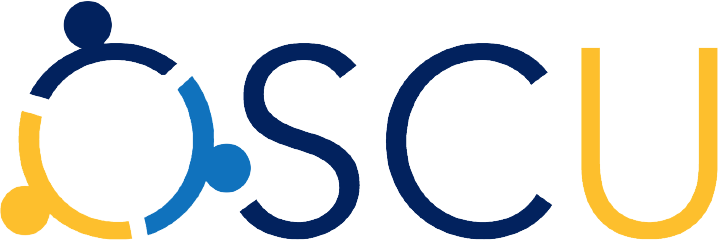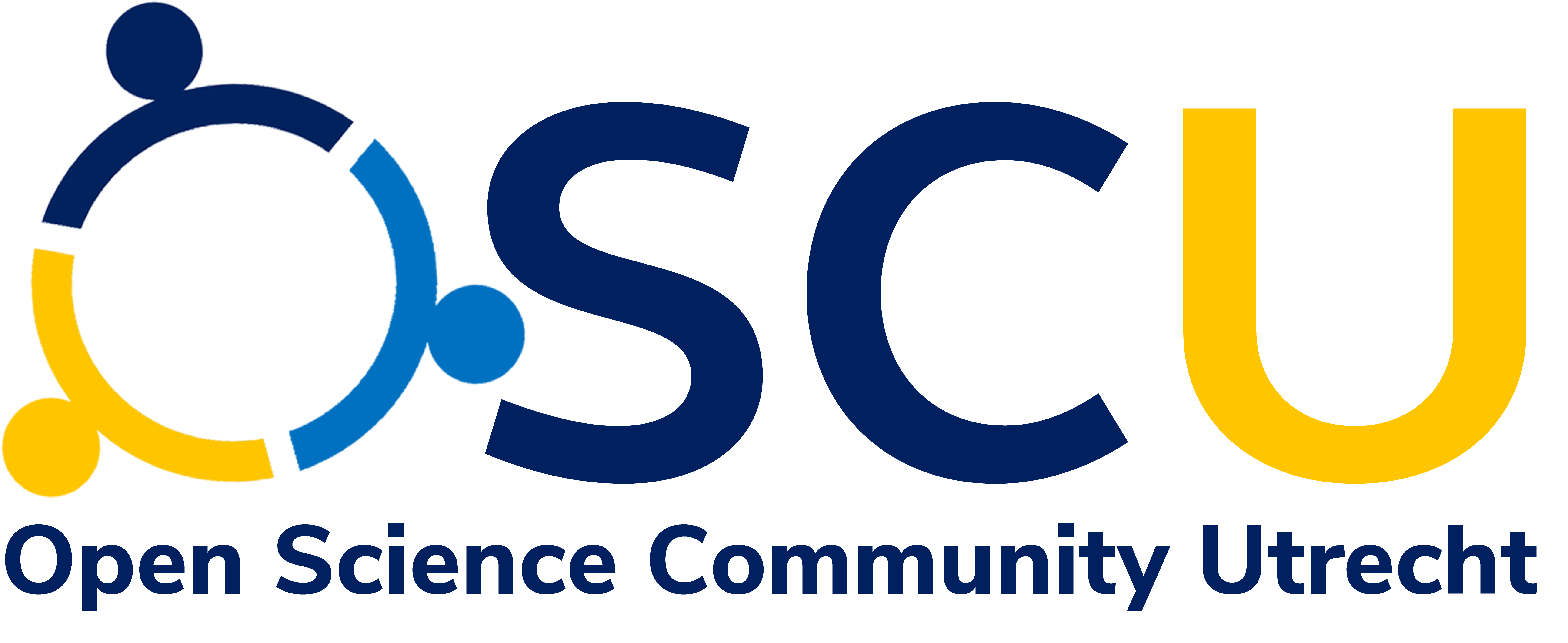News, Blog and Podcast
The history of the Open Science Community Utrecht
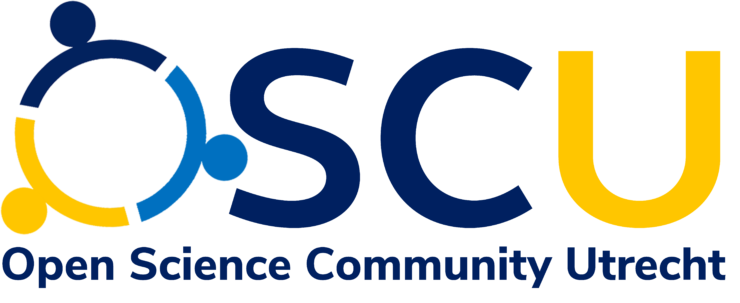
This is the first part of the 2023 OSCU Report ‘The past, present and future of the Open Science Community Utrecht’.

History of OSCU
2017: What started it all
The story of OSCU starts with a cup of coffee. In 2017, Loek Brinkman and Anita Eerland were introduced to each other by a colleague and went for a cup of coffee at Utrecht Science Park. Coming from different backgrounds (Loek has a PhD in Neuroscience, Anita in Forensic Psychology), both of them had an interest in Open Science and wanted to ‘do something’ to improve science. They both frequently attended events that focused on Open Science, such as the annual conference of the ‘Society of the Improvement of Psychological Science’. What they realised is that at such events, they would always meet the same kind of people, if not the actual same people. Open Science was a topic that was discussed within an ingroup, an ‘Open Science Bubble’. Moreover, some of the hardliners within the Open Science Bubble could be quite condescending toward those outside of the bubble, considering their workflows superior to those of others. In this form, it was unlikely for Open Science to become mainstream.
About the same time, the first draft of the Open Science Program at Utrecht University was opened up for consultation and the whole of the university was invited to provide feedback. Anita and Loek were first of all surprised (in a good way!) that their university was already taking Open Science so seriously, but at the same time disappointed by the amount of engagement that the draft mustered. They realised that if you want change, you need to start at the bottom. The transition to Open Science is foremost a culture change and needs to be led by the research community by and large. This created a sense of urgency to reach beyond the Open Science Bubble and attract newcomers to Open Science. By connecting newcomers and experienced peers, newcomers could ease into Open Science in a friendly learning environment. For the experienced peers, this would create an opportunity to connect with like minded peers and spread the gospel of Open Science.
2018: And so it began…
Loek and Anita reached out to colleagues that had (some) experience with Open Science and invited them to join OSCU. Joining OSCU entailed that they would have a profile page on the OSCU website that showed their OS expertise for which others could contact them. Upon joining OSCU, members would also indicate what they wanted to learn regarding Open Science. A lot of effort was spent on reaching out to people and asking them in person whether they were interested in joining OSCU. They also took care to have the right tone of voice in all communication, stressing that OSCU was particularly open to newcomers. Slowly, but steadily, new members signed up for OSCU. The increase in members was by no means a linear process. Instead, batches of members would sign-up, for example following a presentation about OSCU at a department. What was particularly effective in terms of attracting new members, was when someone in a leadership position, for example the head of a research group or department, would send-out mass-emails to a large group of colleagues, stating that they joined OSCU and invited others to join as well. More often than not, such emails were sent after the OSCU coordinators requested their colleagues in leadership positions to do so.
From the very start of OSCU, events were organised for OSCU members (although all events were open for non-members as well). It started with a kick-off event on June 18th 2018 with an inspirational lecture on OS, followed by a round-table discussion and the official launch of OSCU (champagne!).
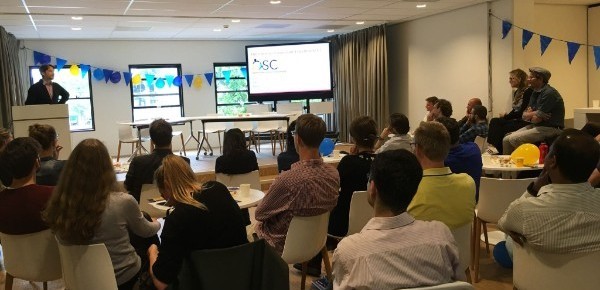
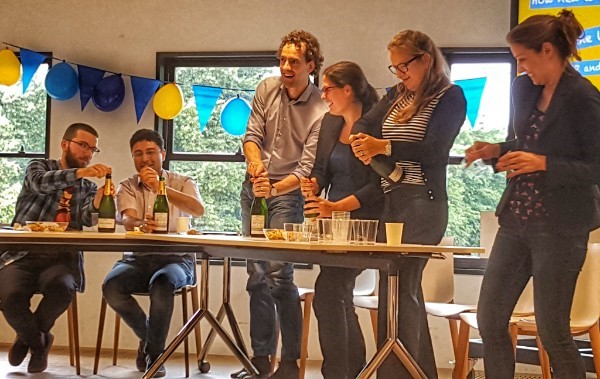
2019: Getting up to speed
In the following year, a series of lectures and workshops was organised, each focused on a particular OS topic. These topics were based on a questionnaire that was distributed amongst OSCU members, where they could indicate what kind of topics they were interested in. These lectures and workshops were open to the entire university and were often organised in collaboration with colleagues from the University Library (who have been active members of OSCU from the very start). Topics included Open Access publishing, working with the Open Science Framework, the UU Open Science Program, Preregistration and FAIR and Open data management. These workshops were typically attended by 10-20 people and provided learning opportunities for those who were relatively new to Open Science, and, by the same token, showed colleagues who were already practising certain OS practices, that they were not the only ones that cared about these practices. For many, this strengthened and consolidated their attitudes toward OS, as they were often the only ones in their direct research environment that committed to these practices.
Almost all members also subscribed to the monthly newsletter of OSCU. The newsletter should not be considered a bonus feature – it is actually one of the most effective means by which OSCU reaches its goals. For the target audience of OSCU (newcomers to OS) OS is not top-priority. This means that they will not attend (all) workshops and events that OSCU organises. On the other hand, getting informed of the latest OS news and updates by reading a newsletter was a time investment that many OSCU members were willing to make. The open- and click-rates of the OSCU newsletters were consistently high (~40-50% open-rates), much higher than those of similar newsletters[1].
Apart from letting newcomers to OS ease into OS, a second aim of OSCU is to scope the opportunities and obstacles that researchers experience regarding OS. These entailed both the opportunities and obstacles experienced by those who were already practising certain OS practices, but, perhaps even more so, by those who were considering or getting started with a particular OS practice. In other words, getting to know what was holding people back and preventing them from engaging in OS. In the early stages of OSCU, this was primarily done by informal conversations with OSCU members.
Organising events and promoting OSCU was very time consuming for the OSCU Coordinators (Loek & Anita). A key factor that enabled them to do all this was that from March 2019 onwards, OSCU received financial support from the UU-OPS. Initially, both coordinators received compensation for 0.2 fte for running the community. This support was provided with the explicit agreement that OSCU would remain independent from the institutional OS program – the coordinators were free to run the community as they saw fit. The rationale behind this approach was that OSCU’s activities would be beneficial to the outcomes of the UU-OSP, even (or because of) the absence of top-down influences. This feat of modern leadership on behalf of the UU-OSP was one of the key elements driving the successes of OSCU. In September 2019, at the opening ceremony of the academic year, OSCU was explicitly mentioned by the Rector Magnificus as one of the successes of 2019.
“De Community staat op voor alle werknemers van de UU om te praten en te leren over tal van praktijken die met Open Science samenhangen.”[2]
2020: Expanding the Core Team
At the beginning of 2020, over 200 people had joined OSCU (Figure 1). Although this was a nice start, it was felt that OSCU had the potential to become much larger and more effective. The main challenge was reaching out to Faculties, other than those that the OSCU Coordinators were involved in. Promotional activities are much more effective when the message originates from an ‘insider’. Also, events and workshops tailored to specific Faculties would be more effective in reaching and engaging researchers. However, organising such events for all Faculties would be very time consuming. A major breakthrough was achieved in the beginning of 2020, when OSCU received substantial additional resources from the UU-OSP, to increase the amount of hours that the coordinators could spend on OSCU (2x 0.4 fte) and that they were allowed to appoint seven OSCU Faculty Ambassadors (one for each of the Faculties of UU) from their members, for 0.1 fte each. This team of Faculty Ambassadors were to be the eyes and ears in their respective Faculties, promote OSCU within the Faculty, and scope the opportunities and barriers as experienced by the OSCU members of that Faculty. Moreover, they were to organise a yearly half-day symposium where OSCU members could showcase their experiences with OS practices to their colleagues. In the first months of 2020, a team of excellent Faculty Ambassadors was recruited and the team was assisted by a student assistant. The first three Faculty Symposia were a big success. The symposia were opened by the respective Deans of the Faculties, and kicked-off with an inspiring key-note lecture. The rest of the symposium was dedicated to short talks where speakers would show their colleagues how they incorporated OS in their workflows. These symposia were typically visited by 60-100 attendees.
And then the COVID19 pandemic hit us all.
For OSCU, this meant switching to online events. At first, we postponed the symposia, hoping the pandemic would not last too long (note: we were wrong). We quickly launched a new format: bi-weekly online lectures which we dubbed ‘Open Science Coffee’ (OSCoffee). Throughout 2020, we organised OSCoffees on a broad range of OS topics. These events were typically visited by 10-20 people, and many people became regular attenders. These events required continuous effort from the team and were not very successful in reaching new people. Nevertheless, it was the best they could do at the time and it kept the community alive. When it became apparent that COVID19 was here to stay for the foreseeable future, the OSCU symposia were organised in online or hybrid forms. These online symposia turned out to be very successful and typically attracted 40-80 attendees. Promoting OSCU amongst the faculties to recruit new members was much harder in these times. Nevertheless, OSCU continued to grow, and by the end of 2020 over 300 people had joined OSCU.
Another milestone was reached in 2020 when the institutional Faculty Open Science Teams (FOST) were formed and the OSCU Faculty Ambassadors were invited to join the respective FOSTs. The FOST is a team of staff members of a particular Faculty and consists of OS Fellows who focus on specific aspects of OS (Open Access, Fair data and software, Public Engagement and Rewards & Incentives). The FOST is chaired by the Dean of that faculty, and is involved in implementing OS at the respective Faculty. By being part of the FOST, the OSCU Faculty Ambassador could now directly voice the opportunities and barriers as experienced by OSCU members to these institutional bodies.
2021: OSCU continues
In 2021, OSCU continued organising Faculty Symposia, which were without exception very successful. Up until the summer break, regular OSCoffees were organised, revisiting some of the popular topics of the previous season and introducing new topics. A big change for OSCU happened in August 2021, when one of the founders/coordinators of OSCU (Anita), left UU for a new position at Radboud University. Needless to say, this was a big loss for the team. The team took this opportunity to restructure the governance of OSCU. Up until then, the founders/coordinators were leading the team. From then onwards, one of the Faculty Ambassadors would get the role of ‘Chair of OSCU’ and take over the leadership position, for which they would be compensated for an additional 0.1fte. The new chair started by formulating their vision and ambitions for the coming year. The remaining coordinator took a step back in terms of leadership and focused more on facilitating the new chair and the team. As part of the new vision, the OSCoffees were discontinued to free up time to experiment with new formats, in particular focused on community building amongst its members, which had accumulated to over 400 at the end of 2021 (Figure 1).
2022: A new face, a new direction
In 2022, at the time of this writing, OSCU continues along the path set-out by the Chair of OSCU. Several Faculty Ambassadors have signed-off in the past months, because they moved to new positions, for which replacements were recruited amongst the OSCU members. Also, Loek Brinkman, the second founder/coordinator has left OSCU, and will be replaced by a new Community Coordinator.
Big steps will be made this year that determine the future of OSCU. The financial support that OSCU has received from the UU-OSP will stop at the end of 2022, as the UU-OSP itself is moving toward a phase where the temporary impulses made by the program need to land and be followed-up within the university. In part III of this report, we explore how OSCU can be structurally and sustainably integrated within the university.
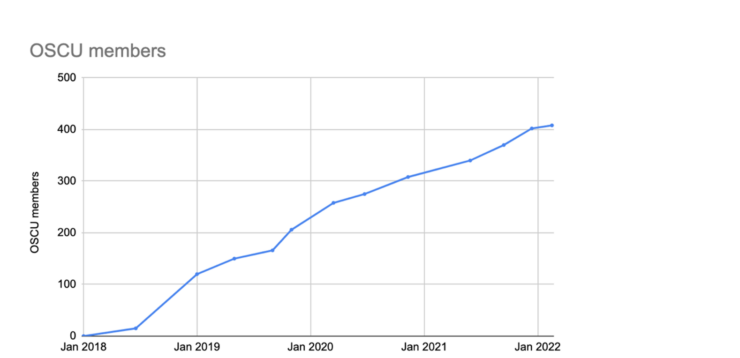
Figure 1: the number of OSCU members from January 2018 until February 2022
National and International Networks of Open Science Communities
This chapter focuses on the history of OSCU in the context of Utrecht University, but it is also of interest to note the impact OSCU had on many other universities. From the very start in 2019, OSCU was actively reaching out to colleagues at other Dutch universities and abroad, to inspire them to start their own local Open Science Communities. Open Science Communities Leiden and Amsterdam were the first to follow. By the end of 2020 all Dutch universities had an Open Science Community in place and also in Sweden and Ireland, similar OSCs were founded (Figure 2). Collectively, the coordinators of the OSCs wrote a whitepaper on the role of OSCs in the transition to OS (Armeni et al. 2021), published a Starter Kit on how to start a local OSC (www.StartYourOSC.com), with an accompanying promotional video (https://vimeo.com/510808878). Since then, the network of OSCs has expanded with OSCs in Sweden, Serbia, Ireland, Portugal, and Saudi-Arabia; and in Aarhus, Denmark, a new OSC is arising by 2023. At the national level, the Dutch OSCs (OSC-NL) are becoming an established player in the OS landscape and representatives of OSC-NL are frequently in contact with stakeholders in the Open Science landscape. Similar activities are taking shape at the international level, where the International Network of Open Science Communities (INOSC, https://www.osc-international.com) interacts with stakeholders at the European level.
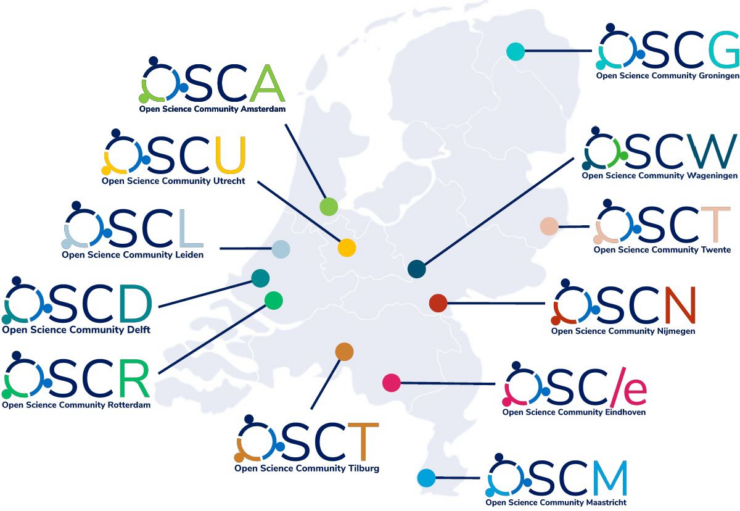
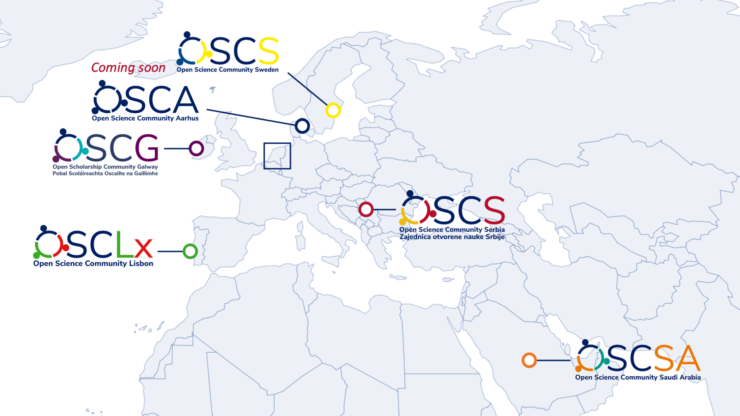
Figure 2: The location of the Open Science Communities in the Netherlands (top) and in other countries (bottom).

Figure 3. Visual timeline of OSCU.
[1] https://mailchimp.com/resources/email-marketing-benchmarks/
[2] https://www.uu.nl/sites/default/files/uu-oaj-2019-2020-henk-kummeling.pdf
